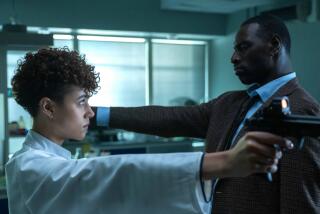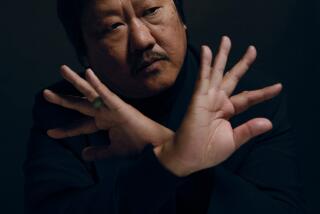MOVIE REVIEWS : Wild, Woolly Action in ‘Made in Hong Kong’ : Film series: At a hyperdrive tempo, these new-generation films go Bruce Lee one better.
Blazing with color, bursting with action, spilling all over with wild effects and go-for-broke pyrotechnics, the six Hong Kong action films that comprise the series “Made in Hong Kong” (Nuart), represent an ultimate triumph of style over substance, zap over content.
This is generic movie-making at its wildest and woolliest, an exploding Oriental cornucopia. Somersaulting warriors fly by, Jacobean vendettas unravel with bloody swiftness. Purple smoke billows out of caverns, witches and wizards whirl in the skies. Zombies in haunted houses grope for the living, stunning maidens in red silks flee through wind-swept forests. Massed gangs of soldiers and gangsters sneer and blast away.
Everything is in a kind of hyperdrive. In American action movies of the ‘50s, a thrill a minute was often promised. Here, a thrill every 10 seconds is more the norm; sometimes the intervals are whittled to two and three.
Hong Kong movies first became famous because of Bruce Lee. These films, made a generation later--by such Lee followers as martial arts director-stars Sammo Hung (“Eastern Condors”) and Jackie Chan (not on this program), and brilliant directors like Tsui Hark (“Peking Opera Blues”) and Ching Siu Tung (“Chinese Ghost Story”)--are more sophisticated and sometimes even more action-crammed than Lee’s: the ultimate movie-movies.
The interpenetration of Eastern and Western cultures is fascinating. American action-movie techniques are germinated by older Asian models--the supernatural lore of China and Japan, Chinese music theater. And there’s a tongue-in-cheek zest here that takes the sting off devices that seem abrasive in some of the American models.
The directors are less a “school” than a tag team. Chan and Hung were Peking Opera acrobats together. Ching Siu Tung worked as action director for both Hark and writer-director John Woo (“A Better Tomorrow”). Hark produces and co-writes for both Tung and Woo--and, from the look of “A Better Tomorrow 1,” he may have partially directed for Woo too.
“A Better Tomorrow 1 & 2” (tonight through Friday) are the most conventional of the sextet. In these gangster revenge sagas, treacherous gang lords are hounded by a good and bad brother (crook and cop), aided by a third, swaggering ex-crook (Chow Yunn Fatt). The first film is zippy and racy, the second more labored, although the sexy Fatt, killed in the original, proved so popular he was brought back as an unlikely “twin brother.”
Sammo Hung’s “Eastern Condors” (Monday and Tuesday) is an even zestier variation on American forms: a mixture of mercenary “Dirty Dozen”-style adventure, with stalwart heroes battling vicious Commies, and the typical one-against-a-bunch martial arts pyrotechnics of Bruce Lee, whose spin-kicking charisma Hung almost matches. There’s a surprising villain here: Haing Ngor, the Oscar-winning refugee of “The Killing Fields.”
It’s in the supernatural sagas, Tung’s “Chinese Ghost Story” (Saturday and Sunday) and Hark’s “Zu: Warriors of the Magic Mountain” (Monday and Tuesday) that the Hong Kong flavor roars out most spectacularly. These are spook sagas from the post-Spielberg, post-video, post-electronic age.
Tung’s “Ghost Story” plays like a cross between Mizoguchi’s spectral romance “Ugetsu” and Sam Raimi’s splashy gore fest “Evil Dead.” Grotesque violence and macabre monstrosities, such as a mile-long killer tongue, contrast with the perfume-ad imagery of the love scenes: a ridiculous/glorious juxtaposition. The even more amazing “Zu,” made by Tsui Hark, is the wildest of them all: a cascade of demons, warriors, “virgin boys” and witches done at a raucous clip, highlighted by such grisly touches as the freezing of the ice princesses and a fierce old man whose weapons include his own eyebrows and sideburns.
If there’s a masterpiece here, it’s Hark (and Tung’s) subsequent effort, “Peking Opera Blues” (Saturday and Sunday), which was shown at the 1988 AFI/FEST and has since picked up a gaggle of East Coast cultists. Hark’s violent editing style--he rarely holds a shot longer than two or three seconds--combines with florid, sumptuous period images: mansions, theaters and misty back alleys.
The Byzantine plot involves three plucky girl-chums--a revolutionary, an actress and a flirty worker--racing nonstop through all the shifting intrigues of the 1913 warlord period. If you have any taste for action and romance in their more excessive forms, “Peking Opera Blues” is a real treat: rich, rare, entrancingly eccentric. So are most of these happily commercial movie-movies “Made in Hong Kong.”
Information: (213) 478-6379.)
More to Read
Only good movies
Get the Indie Focus newsletter, Mark Olsen's weekly guide to the world of cinema.
You may occasionally receive promotional content from the Los Angeles Times.










